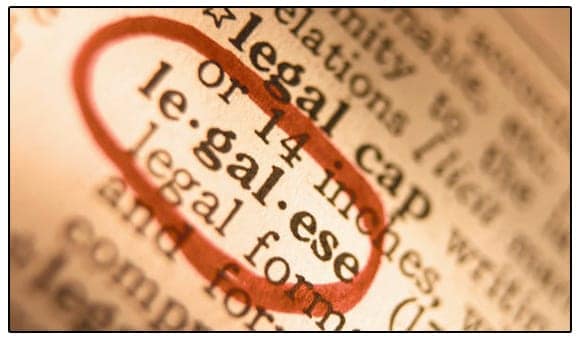What is Legalese? – Legalese refers to “legal English” or language that is full of legal terminology, phrases, terms or academic words. It is a traditional style of legal writing, but it is often reader unfriendly. Therefore, we have set out many common terms used in Criminal Law/Courts to assist in understanding legal terminology in plain language.
If you have a legal matter and require further information, feel free to contact our office. One of our experienced criminal lawyers would be happy to assist.
1. Accusation – a claim that a person has committed a crime.
2. Accused – a person who is alleged to have committed a crime.
3. Acquittal – when the court finds the accused person not guilty of committing the alleged crime.
4. Adjournment – to reschedule a court hearing to another day.
5. Affidavit – a formal written statement made under oath.
6. Allegation – a formal accusation made against a person for alleged wrongdoing however, it is not yet proven to be true.
7. Appeal – When either the accused or Crown Counsel ask a higher court to review the decision of the lower court because they believe there was an error. In Criminal Law, an accused can appeal a conviction or sentence.
8. Arraignment – a proceeding in criminal court where the accused, informed of the charges in an information, is asked to plead guilty or not guilty to the charges against him/her.
9. Arrest Warrant – a court order giving police (or other officers) permission to arrest a person and bring them before the court.
10. Bail/Judicial Interim Release – the release of a person accused of a crime, prior to trial, under specific conditions designed to ensure that the accused attends court and faces the charges against him/her.
11. Beyond a Reasonable Doubt – the standard of proof in criminal law which has to be established before there can be a finding of guilt.
12. Complainant – (i.e. the victim) – the person who made a formal police complaint against the accused person.
13. Conviction – When the charge(s) against an accused person is proven beyond a reasonable doubt and a guilty finding is entered.
14. Criminal Code of Canada – Federal legislation (law) that governs crime and punishment in Canada.
15. Criminal Record – A record/information about a person’s involvement (if any) with the criminal justice system.
16. Crown Counsel – A lawyer employed by the Provincial or Federal government to prosecute persons accused of committing a crime under the Criminal Code or other federal or provincial law.
17. Custody – when a person is held by police at the station or is in a correctional institution (provincial or federal).
18. Disclosure – the documents provided by Crown Counsel to the accused (or his/her lawyer) relating to the evidence or circumstances of the case against the accused. The Crown must share all relevant information gathered during the investigation with the accused.
19. Disposition – (i.e. sentencing) – a hearing at which the accused has plead guilty to the charges against them and faces punishment.
20. First Appearance – the first time an accused person appears in court.
21. Guilty – when an accused person admits (i.e. pleads guilty) or is found guilty after trial to have committed the offence(s) for which s/he is charged.
22. Incarceration/Imprisonment – to be kept in custody in a correctional institution for a specified period of time after being found guilty of committing a crime.
23. Indictment – a document containing the formal list of charges for indictable offences (more serious offences under the Criminal Code).
24. Information – a formal accusation by Crown Counsel that the accused committed a crime under the Criminal Code or other federal or provincial statues.
25. Intent – refers to a person’s state of mind with which the act is done. Intent in criminal law is separated into two concepts: “specific intent” and “general intent”. Specific intent refers to a state of mind where the accused intents a certain consequence. General intent refers to the intent to do an act that the law prohibits (whether a specific consequence was intended or not).
26. Mens Rea – “guilty mind” – those without sufficient mental capability cannot be judged guilty of a crime.
27. Peace Bond – a court order (with conditions) made by a judge for the purpose of protecting a person (most often the complainant) from the accused.
28. Plea – The accused person’s statement pleading “guilty” or “not guilty” in answer to the charges.
29. Promise to Appear – A notice issued by the police and signed the accused promising to appear in court a specific time, day and place to respond to the criminal charge.
30. Sentence – the punishment ordered by the court after an accused person has been found guilty of the offence for which they are charged.
31. Stay of Proceedings – an action taken by Crown Counsel to drop the charges against the accused, ending the prosecution.
32. Summons – a formal notice issued to the accused ordering them to appear in court at a specific time and place.
33. Trial – a court proceedings where the Crown presents in case against the accused. Then trier of fact (judge or jury) determined if the accused person is guilty or not guilty of the crime they are alleged to have committed.

